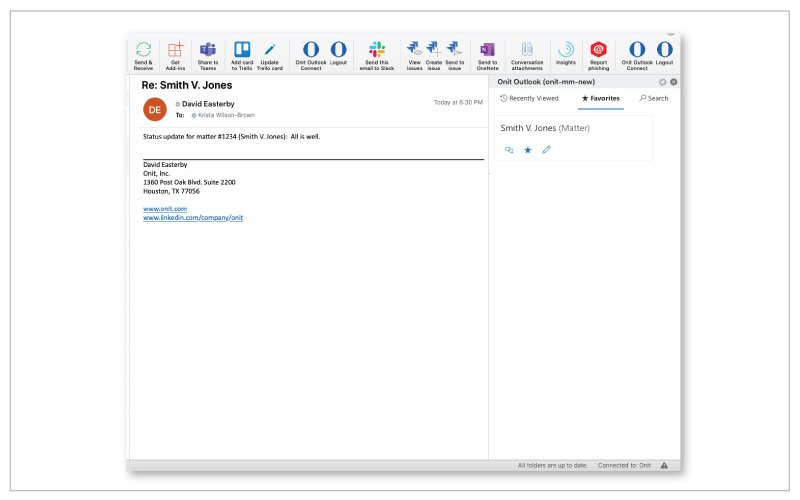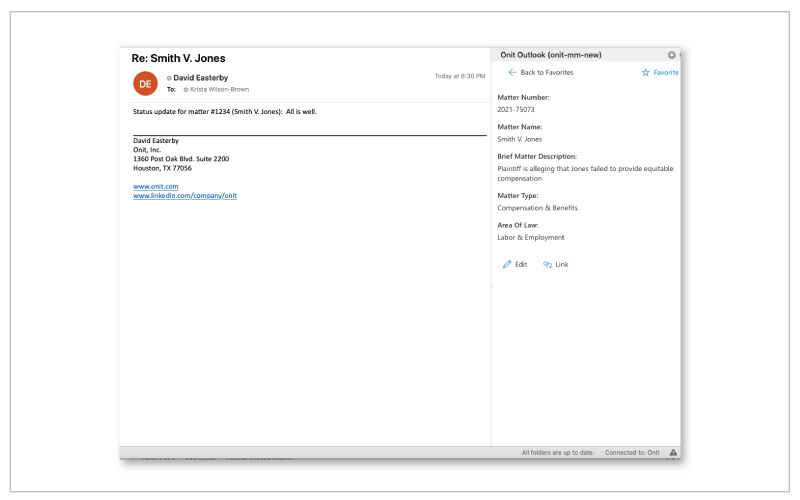
At Onit, we always look for ways to innovate for our customers. An essential part of this priority has been strategically combining with other disruptive companies that are changing the way the world does business. To that end, Onit is proud to announce its fourth strategic acquisition since 2019: Bodhala, the leading provider of legal spend analytics, benchmarking and market intelligence.
The combination of Onit’s and Bodhala’s capabilities creates the most complete enterprise legal management solution on the market, allowing corporate legal departments to evolve legal spend data into actionable intelligence.
Hear Onit CEO Eric M. Elfman and Bodhala CEO Raj Goyle discuss the acquisition and how actionable intelligence is the next wave of business transformation.
Actionable Intelligence for Legal Spend Management
A revolution of data and intelligence has been hitting every sector in recent years, and the legal industry is no exception. Running legal departments on actionable data is the future of digital transformation.
Bodhala helps corporate counsel understand what they should be paying outside counsel, making it easier to source law firms at competitive and market-driven rates. With its data and actionable intelligence, corporate legal departments can identify whether they should be paying the amounts they’re paying, whether they’re paying market price, if they’re properly allocating their work among their various law firms and more.
How does this translate to success? Here’s one example.
The general counsel of one of the largest private equity firms wanted to address annual rate increases from outside counsel. Their rates had been rising well above inflation every year. With Bodhala, the company conducted a competitive analysis of its law firms, compared rates to other firms in the market based on the type of law and complexity of work and gathered internal benchmarking across its panels.
After this analysis, the PE firm had the quantitative, actionable intelligence needed to negotiate a decrease in proposed annual outside counsel rates by 17% and save $27 million.
The Most Complete Enterprise Legal Management Solution on the Market
The combination of Onit and Bodhala creates the most complete, full-lifecycle enterprise legal management solution on the market.
Onit customers already have access to industry-leading enterprise legal management, AI-enabled invoice review and AI-based business intelligence and business process automation platforms. Now, with Bodhala, they can leverage legal spend analytics, benchmarking and market intelligence for a quantum leap in the value and savings they can produce for their businesses.
Bodhala will operate as an independent subsidiary of Onit. It is the third acquisition for Onit in less than a year. In November 2020, Onit acquired legal AI innovator McCarthyFinch and then document automation leader AXDRAFT 30 days later. Onit also acquired SimpleLegal, a modern legal operations software provider, in May 2019.
If you are an Onit or Bodhala customer, reach out to your account managers for more information or you can email Onit at [email protected].
To hear the CEOs of Onit and Bodhala discuss the acquisition, the strategy behind it and what it means for Onit and Bodhala customers, tune in to this podcast.





 The Onit email integration is the shortcut you need to handle your email and work in the same place
The Onit email integration is the shortcut you need to handle your email and work in the same place



